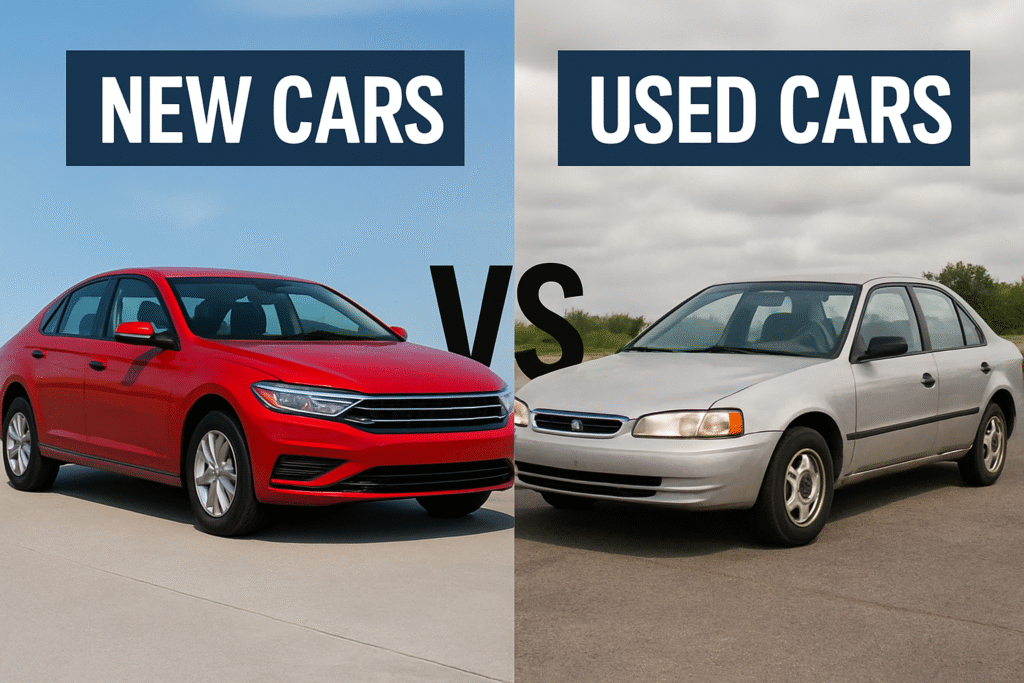The Indian automotive market has witnessed tremendous growth over the past decade, and with it, the used car segment has emerged as a viable alternative for budget-conscious buyers. But the question remains: should you actually buy a used car in India? The answer isn’t straightforward, as it depends on various factors including your budget, requirements, and risk tolerance.
The Current State of India’s Used Car Market
India’s pre-owned car market is booming, with over 4 million used cars sold annually. The market has become more organized with platforms like Cars24, Spinny, and CarDekho making the buying process more transparent. However, despite these improvements, buying a used car in India still comes with its unique set of challenges and opportunities.
Used Car vs. New Car in India –
| Aspect | Used Car | New Car |
|---|---|---|
| Cost | 20–40% cheaper than new, major depreciation already absorbed | High upfront cost, immediate 20–30% depreciation after purchase |
| Insurance | Lower premiums due to reduced Insured Declared Value (IDV) | Higher premiums since IDV is based on full price |
| Variants & Brands | Budget allows higher trims/premium brands (e.g., used BMW vs. new Maruti) | Limited to entry-level or mid variants within the same budget |
| Depreciation | Slower depreciation after purchase | Fastest depreciation in first 2–3 years |
| Warranty | Limited or no warranty unless certified pre-owned | Full manufacturer warranty (3–5 years) |
| Maintenance Costs | May be higher if not well-maintained; risk of hidden issues | Generally lower in early years; covered by warranty |
| Financing | Higher interest rates & shorter tenures | Lower interest rates, easier financing |
| Choice & Availability | Limited options in model, color, variant | Full choice of trims, color, latest features |
| Reliability | Depends on previous owner’s care; inspection required | Guaranteed reliability with new components |
| Technology & Features | May miss latest tech (ADAS, connected features, BS6 norms) | Always up-to-date with latest features & safety tech |
| Best For | First-time buyers, budget-conscious families, city commuters, enthusiasts | Long-distance travelers, low-maintenance seekers, tech lovers |
| Risks | Unknown history, hidden problems, possible accident/flood damage | Expensive upfront, higher depreciation |
| Resale Value | Better value retention if bought after 2–3 years | Higher initial drop, improves only after 4–5 years |
In short:
New cars = Best for peace of mind, warranty protection, and latest features.
Used cars = Best for saving money, upgrading to premium models, or short-term/secondary car use.
The devil’s in the details—get the full picture below.
Advantages of Buying a Used Car in India
1. Significant Cost Savings
The most compelling reason to consider a used car is the substantial financial benefit. A new car loses approximately 20-30% of its value the moment it leaves the showroom. By purchasing a 2-3 year old vehicle, you can avoid this initial depreciation hit while still getting a relatively modern car with updated features.

For instance, a car that costs ₹10 lakhs new might be available for ₹6-7 lakhs after three years, representing savings of ₹3-4 lakhs. This difference can be invested elsewhere or used to upgrade to a higher variant or better brand.
2. Lower Insurance Premiums
Used cars typically have lower insurance costs since the Insured Declared Value (IDV) is based on the current market value rather than the original purchase price. This can result in annual savings of ₹10,000-30,000 depending on the car’s value and your location.
3. Access to Higher Variants and Premium Brands
Your budget for a new entry-level car might get you a well-equipped, higher variant used car or even a premium brand vehicle. This means you could potentially drive a BMW, Mercedes, or Audi within the budget of a new Maruti Suzuki or Hyundai.
4. Slower Depreciation
Since the steepest depreciation has already occurred, used cars depreciate at a much slower rate. This means better value retention if you decide to sell the vehicle later.
5. Established Reliability Data
With a used car, especially popular models, you have access to real-world reliability data, common issues, and maintenance costs from existing owners. This information helps you make an informed decision about long-term ownership costs.
Disadvantages of Buying a Used Car in India
1. Unknown Maintenance History
Perhaps the biggest risk with used cars is the uncertainty around how well the previous owner maintained the vehicle. Poor maintenance can lead to expensive repairs down the line, potentially negating the initial cost savings.

2. Limited or No Warranty
Most used cars come with minimal warranty coverage compared to new cars, which typically offer 3-5 years of comprehensive warranty. Any major repairs will be entirely your responsibility.
3. Potential for Hidden Problems
Despite inspections, used cars may have underlying issues that only surface after purchase. These could include engine problems, electrical issues, or accident damage that wasn’t properly disclosed.
4. Financing Challenges
Getting a loan for a used car often involves higher interest rates (typically 1-3% higher than new car loans) and shorter repayment tenures. Banks and financial institutions are also more stringent about the age and condition of the vehicle.
5. Limited Model and Color Choices
Unlike buying new, your options are limited to what’s available in the used car market. You might have to compromise on color, variant, or specific features you desire.
Who Should Consider Buying Used Cars?
First-Time Car Buyers
If you’re buying your first car and want to gain driving experience without the pressure of maintaining a brand-new vehicle, a used car makes perfect sense. The lower financial commitment allows you to learn about car ownership without significant financial stress.
Budget-Conscious Families
Families looking to upgrade from a two-wheeler or add a second car to their household often find used cars more financially viable. The money saved can be allocated to other family priorities.
City Commuters
For those primarily using the car for city commuting where parking space is limited and minor scratches are inevitable, a used car removes the anxiety of keeping a new car pristine.
Enthusiasts and Hobbyists
Car enthusiasts looking for specific models, discontinued variants, or vehicles for modification projects often turn to the used car market where unique finds are possible.
Who Should Stick to New Cars?
Long-Distance Travelers
If your primary use involves frequent long-distance travel or highway driving, the reliability and warranty coverage of a new car provides peace of mind and potentially lower long-term costs.
Low-Maintenance Preference
Buyers who prefer minimal involvement in vehicle maintenance and want the assurance of warranty coverage should consider new cars.
Latest Technology Seekers
If having the latest safety features, connectivity options, and technology is important to you, new cars are the obvious choice.
Key Factors to Consider Before Buying Used
1. Vehicle History and Documentation
Always verify the car’s registration documents, insurance papers, and service history. Look for signs of accident damage, flooding, or commercial use that might not be immediately apparent.
2. Mechanical Inspection
Invest in a professional pre-purchase inspection, especially for cars older than 5 years. This should include engine condition, transmission health, brake system, suspension, and electrical components.
3. Market Research
Research the specific model’s reliability, common issues, spare parts availability, and typical maintenance costs. Online forums and owner groups provide valuable insights into real-world ownership experiences.
4. Total Cost of Ownership
Calculate not just the purchase price but also expected maintenance, repairs, insurance, and fuel costs over your intended ownership period.
5. Resale Value
Consider how well the model holds its value. Popular brands like Maruti Suzuki, Hyundai, and Honda typically have better resale value than others.
Best Practices for Used Car Buying in India
Research Thoroughly
Spend time researching the specific model, year, and variant you’re considering. Check online reviews, reliability reports, and typical market prices for similar vehicles.
Inspect in Daylight
Always inspect the car during daylight hours when you can properly assess the paint condition, panel alignment, and overall appearance.
Test Drive Comprehensively
Take an extended test drive covering city roads, highways, parking, and various driving conditions. Pay attention to engine noise, gear shifts, steering response, and brake feel.
Verify Legal Compliance
Ensure the car meets current emission norms (BS6), has valid insurance, and clear legal title. Check for any pending challans or legal issues.
Negotiate Wisely
Used car prices in India are generally negotiable. Research market rates and don’t hesitate to negotiate, but be realistic about the car’s condition and market demand.
Consider Certified Pre-Owned Programs
Many manufacturers now offer certified pre-owned programs that provide some warranty coverage and quality assurance. While slightly more expensive, these programs offer additional peace of mind.
Popular Used Car Segments in India
Hatchbacks
Models like Maruti Swift, Hyundai i20, and Honda Jazz offer excellent value in the used market with good reliability and low maintenance costs.
Compact Sedans
The Maruti Dzire, Honda Amaze, and Hyundai Xcent provide more space than hatchbacks while maintaining reasonable running costs.
SUVs
Used SUVs like the Hyundai Creta, Maruti Vitara Brezza, and Tata Nexon have gained popularity, though they command premium prices even in the used market.
Luxury Cars
The used luxury car segment offers excellent value for those wanting premium features at affordable prices, though maintenance costs remain high.
Making the Final Decision
The decision to buy a used car in India ultimately depends on your individual circumstances, risk tolerance, and automotive needs. For many Indian buyers, especially first-time car owners and budget-conscious families, used cars offer an excellent entry point into car ownership.
However, success in the used car market requires patience, research, and sometimes a bit of luck. If you’re willing to invest time in finding the right vehicle and can handle some uncertainty regarding future maintenance needs, buying used can provide excellent value.
On the other hand, if you prefer the peace of mind that comes with warranty coverage, want the latest features, or plan to keep the car for many years, buying new might be the better choice despite the higher upfront cost.
Conclusion
Buying a used car in India can be a smart financial decision when done right. The key is thorough research, careful inspection, and realistic expectations about ownership costs. While there are risks involved, the potential savings and access to better vehicles within your budget make it an attractive option for many buyers.
Remember that whether you choose new or used, the most important factors are buying from reputable sources, maintaining the vehicle properly, and choosing a model that suits your specific needs and budget. In India’s diverse automotive landscape, both new and used cars have their place, and the right choice depends entirely on your personal situation and priorities.
The used car market in India will continue to evolve with better regulations, more organized players, and improved transparency. For now, informed buyers who do their homework can find excellent deals and reliable transportation in the pre-owned car segment.

